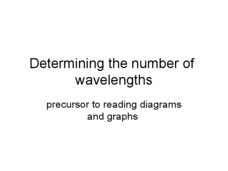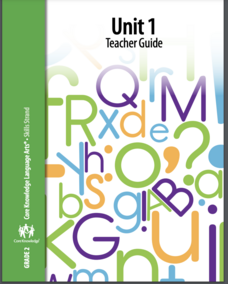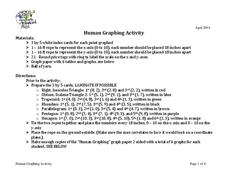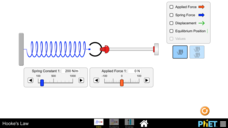Curated OER
Determining the Number of Wavelengths
After displaying three diagrams showing 1, 1 1/2, and 2 wavelengths, the slide show presents more diagrams and expects pupils to determine the number of wavelengths in each. No labels or explanations are provided, so this would be useful...
Curated OER
The Merchant of Venice: Fun Trivia Quiz
Truly an exercise in trivia, this quiz nevertheless assesses comprehension of the Shakespeare play, and elicits one short answer to the question: "What line from 'The Merchant of Venice' can be translated as 'All that glitters is not...
Curated OER
City of the Beasts: Fun Trivia Quiz
An online interactive quiz that checks reading comprehension for Isabel Allende's young adult novel City of the Beasts. Creator based this quiz on the Spanish language version, so pre-screen for accuracy if your class is using the...
Curated OER
Personal Descriptions
Review descriptive vocabulary with this learning exercise. Beginning Spanish scholars choose which word would best complete the 32 sentences provided. Note that some of the sentences could use either option, so consider having learners...
Curated OER
Les membres de ma famille
Pictures are missing from this vocabulary-based PowerPoint! Add some pictures of different family members to help your beginning French language learners remember the new vocabulary. As of right now, this presentation just lists the...
Core Knowledge Foundation
Second Grade Skills Unit 1: The Cat Bandit
For twenty-two lessons over five weeks, scholars practice sound-spelling correspondence, spelling patterns, tricky words, and reading decodable text. Assessments aid in small group formation and gauge comprehension. Lessons begin with a...
Austin Independent School District
Forearm Pass/Setting
Here is a beautifully designed volleyball lesson plan on the forearm pass/bump and overhead pass/set. It includes a detailed multimedia presentation and set of instructional guidelines, skill cues, and lists of strategies for...
Shasta County Office of Education
Human Graphing Activity
Take graphing outside and make a giant coordinate plane to plot your human points. Young graphers are each given a coordinate for a particular shape and asked to make the geometrical shapes one by one. Those not plotted are to write down...
PhET
Molecule Shapes: Basics
In molecules, bonds rotate about the nucleus due to the repulsion of subatomic particles. In a simulation, learners manipulate the bonds of a molecule to meet the atoms' needs. They can then see the specific molecular shapes of five...
PHET
Energy Forms and Changes
Is the ice cooling down the water or is the water melting the ice? Here is a simulation that explores thermal energy transfer with iron, brick, and water. It demonstrates the flow of energy and what happens when each material is either...
PHET
Faraday's Electromagnetic Lab
"But still try, for who knows what is possible." - Michael Faraday. Faraday's advice features in a simulation that permits pupils to play with a bar magnet in order to make a light bulb glow connecting electromagnetic induction to...
PHET
Forces and Motion
The average American will move 12 times, which results in a lot of moving furniture! Class members consider the forces required to move objects with a creative simulation that opens with the forces required to push a filing cabinet....
PHET
Electric Field of Dreams
What is the largest electric field in the world? The world itself! This explains why you use a magnetic compass to determine direction. During the simulation, scholars add charges to their electric field to see how the field reacts. An...
PHET
Energy Skate Park
Apply the concepts of conservation of energy to a skater to introduce a fun way the concepts apply to real life. Scholars build tracks, ramps, and jumps then analyze the various types of energy and friction. For an added challenge,...
PHET
Energy Skate Park: Basics
Keep calm and half pipe. An exciting simulation teaches pupils about energy transfer from potential to kinetic and thermal as a skater moves through a half pipe or other track. After a brief introduction, scholars can build their own...
PHET
Fluid Pressure and Flow
This simulation begins with an exploration of water pressure and atmospheric pressure. In the flow portion, scholars reshape a pipe and see fluid dynamics at work. The water tower portion encourages pupils to determine how water...
PHET
Forces and Motion: Basics
How is tug of war related to pushing a refrigerator? Here's a simulation connects these two activities with Newton's First Law of Motion. Four different simulations allow scholars to explore net force with tug of war, motion with pushing...
PHET
Gravity And Orbits
Have you ever wanted to turn off gravity? This simulation allows learners to do just that in addition to altering other variables. Scholars can move the sun, Earth, moon, and space station to see how distance affects gravitational pull....
PHET
Masses and Springs
Have you ever stretched out a Slinkie so much it wouldn't go back to its original shape? Slinkies, like all springs, follow Hooke's Law. A simulation uses springs and masses to demonstrate kinetic, potential, and thermal energy. It...
PHET
Faraday's Law
Could a flux capacitor really work? An engaging simulation encourages scholars to investigate Faraday's law. They experiment with various speeds, magnitude, voltage, and different-sized coils. Hopefully experimenters will be able to...
PHET
Forces in 1 Dimension
A realistic simulation uses charts to show forces, position, velocity, and acceleration versus time based on how the simulation is set up. Once those concepts are mastered, scholars use free body diagrams to explain how each graph...
PHET
John Travoltage
Did you get to play with electric currents or were you grounded? An electrifying simulation shows how building up a charge of electricity creates a static shock once grounded. Pupils rub John's foot across the carpet and view the buildup...
PHET
Hooke's Law
Everything from pens to cars use springs — some are just on a larger scale! An interactive simulation encourages pupils to stretch and compress springs while observing the changes to force, displacement, and potential energy. Then they...
PHET
My Solar System
Orbit diagrams appear to be a work of mathematical art. The simulation helps scholars build their own systems of planets, stars, moons, etc., to observe their orbits. By altering their positions, velocities, and masses, a variety of...
Other popular searches
- Translations and Reflections
- Geometric Translations
- Math Translations
- Geometry Translations
- National Anthem Translations
- Translations and Rotations
- Equation Translations
- Language Translations
- Graphing Translations
- Horizontal Translations
- Mathematical Translations
- Translations of Shapes

























